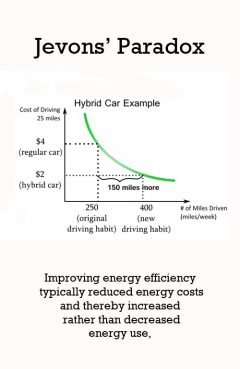Jevons Paradox

Release Date: //
Country of Release:
Length:
MPAA:
Medium: Paradox
Genre:
Release Message: Increases in efficiency lead to even larger increases in demand. Authored by William Stanley Jevons.
Description: In economics, the Jevons paradox (sometimes Jevons effect) is the proposition that technological progress that increases the efficiency with which a resource is used tends to increase (rather than decrease) the rate of consumption of that resource.[1] In 1865, the English economist William Stanley Jevons observed that technological improvements that increased the efficiency of coal use led to increased consumption of coal in a wide range of industries. He argued that, contrary to common intuition, technological improvements could not be relied upon to reduce fuel consumption.[2] The Jevons paradox was first described by the English economist William Stanley Jevons in his 1865 book The Coal Question.